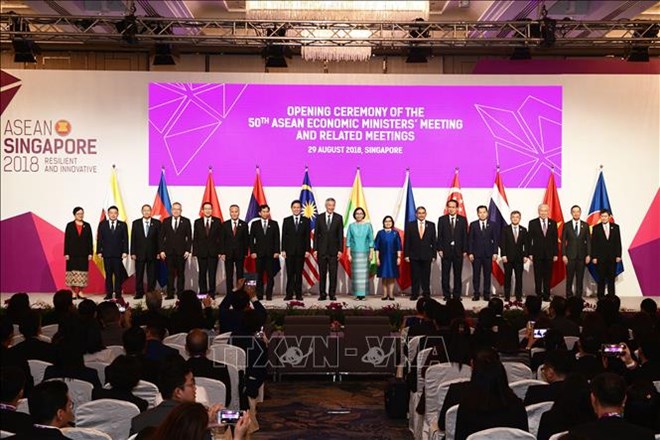RCEP meeting concludes in Singapore
September 3, 2018 | Expert Insights

Ministers from the 16 countries that are negotiating over what could become the world’s largest free trade area, agreed in Singapore on Friday on a package of deliverables they hope to achieve by the end of the year.
Background
The Regional Comprehensive Economic Partnership (RCEP) is a proposed mega-regional Free Trade Agreement (FTA) between 16 Asia-Pacific countries including the 10-member ASEAN countries, China, Japan, India, South Korea, Australia and New Zealand.
The RCEP will become the largest trade bloc in terms of population with nearly 3.5 billion people. It will also have an estimated 40% of the world’s GDP and dominate 30% of the global trade. RCEP will cover trade in goods, trade in services, investment, economic and technical cooperation, intellectual property, competition, dispute settlement and other issues.
Analysis
The latest round of negotiations for the Regional Comprehensive Economic Partnership (RCEP) in Singapore made “good progress”, though considerable work remains to reach the goal of “substantially concluding” the trade pact by the end of the year, said Singapore’s Minister for Trade and Industry Chan Chun Sing on Saturday.
The driving force behind the acceleration of talks seems to be an almost united fear of the protectionist policies of U.S. President Donald Trump. "The substantial conclusion of RCEP by the end of 2018 will reaffirm our region's continued support for free trade against the backdrop of rising protectionist sentiments," Singaporean Trade Minister Chan Chun Sing said. Adding to the urgency is the approach of elections in Indonesia and India in 2019, which raises the risk that a missed opportunity to conclude the agreement this year may not come around again soon.
In a joint statement released after the meeting, they “expressed the hope that completion of the package would signify the substantial conclusion of the RCEP negotiations this year.” The meeting was held to give a political push to the Regional Comprehensive Economic Partnership.
The package comprises four components — markets for goods, services, investment and intellectual property rights.
“It was a very intense discussion in the last two days because there were gaps that we need to fill in among some of the members,” an official from an Association of Southeast Asian Nations country said. “Now that we have agreed on the package, it will be easier for the negotiators now to have a path forward in trying to find a conclusion to those difficult areas,” the official said.
Asked about the difficulties between China and India, which are said to have posed the main stumbling block in the negotiations over the past several years, the official said there is a need for some kind of a middle path for them to reach a mutually beneficial agreement.
Indian Minister of Commerce and Industry Suresh Prabhu said he had concerns during the meeting about some of the elements in the proposed agreement. He said India continues to face social challenges in terms of poverty and its large agriculture-based population. “All those concerns have been expressed and I am sure they’ll be addressed by negotiations which we will continue in 2019,” Prabhu said.
Another ASEAN member official said that while all 16 countries agreed on the targets in the package, they have not yet succeeded because there are sensitive, political issues requiring government consultation. He said the negotiating countries “need to be flexible, to accommodate the differing levels of development of certain countries.” Officials said an RCEP chief negotiators’ meeting is slated to be held in Auckland in late October before the next ministerial meeting, just before the ASEAN leaders’ summit in November.
RCEP holds additional significance in that it promises to bring China and Japan into the same cooperative circle on trade - something the TPP lacks. An ongoing improvement in Sino-Japanese relations works in favour of an RCEP agreement but may draw suspicion from Washington, which fears its hard line on trade with China will be undermined.
Assessment
Our assessment is that an Asian free trade agreement as broad as RCEP could force President Trump to face the prospect of American manufacturers and farmers being put at a disadvantage in the region's vast markets. We believe that India has been unsure about remaining in the RCEP because of its $63 billion trade deficit with China.








Comments